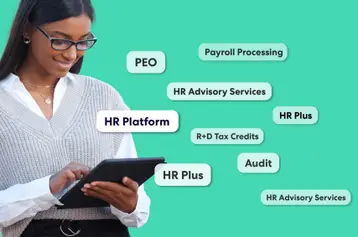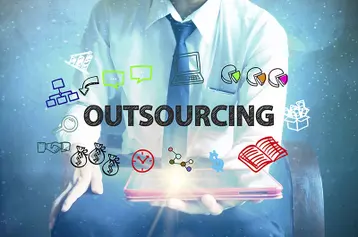PEO vs. Payroll Service Provider: Which is Right for Your Business?

Table of contents
- 1.What is a professional employer organization?
- 2.What is a payroll service provider?
- 3.PEO vs. PSP: Key Differences
- 4.Contractual obligation
- 5.Employee benefits
- 6.Company culture
- 7.Costs
- 8.Responsibility
- 9.Which One is Right for Your Business?
- 10.Where do you need flexibility?
- 11.How much help do you need with HR compliance?
- 12.What is your budget? Is the service worth the investment?
- 13.PEO vs. Payroll Service Provider
When you're running a small or medium-sized business, navigating both payroll services and HR services can be a huge undertaking, especially if you have limited resources. You may be considering outsourcing one or the other, or possibly both. If you decide to outsource, you'll most likely choose either a professional employer organization (PEO) or a payroll service provider (PSP). In this comprehensive guide, it will provide insights about PEO vs. PSP and what may be the best option for your business.
What is a professional employer organization?
A PEO provides comprehensive HR outsourcing solutions to small and medium-sized businesses. PEOs help with payroll processing, benefits administration, payroll tax administration, and HR compliance. When a client engages with a PEO for services, the PEO becomes the co-employer of the client’s employees for certain services. This means that the client continues to manage their employees and run the daily operations, and the PEO, as the co-employer, is the employer of record and assumes certain responsibilities such as payroll processing and tax filings and also helps with human resources functions.
The PEO is dedicated to helping businesses with their human resources needs so the business can focus their resources in other business areas, thereby freeing up time and resources for its core operations and growth.
What is a payroll service provider?
A PSP primarily focuses on the process of managing and processing payroll. This typically includes tasks like calculating payroll amounts, withholding payroll taxes, administering employment benefits, and ensuring that funds are paid to employees' accounts. The payroll service provider may also remit payroll taxes for the company. PSPs provide an outsourced service for payroll processing.
PEO vs. PSP: Key Differences
Contractual obligation
Payroll service provider (PSP). PSPs are typically contracted to handle specific payroll functions and tasks. The contractual obligations are generally straightforward and centered on the processing of payroll accurately and on time.
Professional employer organization (PEO). The contractual obligations between PEO and client can be broader and more complex. The PEO may be responsible for payroll processing and payroll tax administration, provide HR compliance guidance, workers' compensation coverage and administration, and often administering employment benefits. The agreement will detail the responsibilities of both the PEO and the client company.
Employee benefits
Payroll service provider (PSP). PSPs may assist with benefits administrative service. However, PSPs generally do not provide access to benefits. They might see that the appropriate amounts for benefits are deducted from paychecks, but they do not provide access to benefit plans.
Professional employer organization (PEO). A PEO offers a much broader range of services, including administering and providing access to benefits. PEOs may also help with other aspects of benefits administration, such as benefits enrollment, compliance, and handling employee questions about PEO-sponsored benefits.
Company culture
Payroll service provider (PSP). The relationship between a PSP and your business can be more transactional. A PSP may not interact directly with your employees unless there's a specific payroll issue. Even though a PSP may free up time for your payroll staff (if you have one) to focus on company culture, it may not play a role in helping with company culture.
Professional employer organization (PEO). A PEO may help with your company culture. Depending on the level of involvement of a PEO, a PEO may help provide guidance, tools, and resources on HR policies, benefits administration, onboarding, training, performance management, and employee relations. All these functions can help your company's culture, so it's important to choose a PEO whose values align with your own.
Costs
Payroll service provider (PSP). Fees can be structured in a variety of ways, including a flat monthly fee, a per-employee-per-month fee, or a per-payroll fee. Costs may be lower than with a PEO, because the services are more limited. However, additional services, like time tracking or HR support, might be available with add-on fees.
Professional employer organization (PEO). Costs may be higher because of the wider range of services. PEOs commonly charge either a flat rate per employee per month or a percentage of the total monthly payroll processed. The administrative cost usually includes payroll processing services, HR support, HR compliance guidance and best practices, and administration of benefits.
Businesses should carefully analyze the costs and benefits of each type of service. While PSPs may appear to be the cheaper option, the comprehensive services and HR support offered by a PEO may be more cost effective, depending on the specific needs of your business.
Responsibility
Payroll service provider (PSP). The ultimate responsibility for payroll taxes and certain HR compliance requirements usually stays with the employer.
Professional employer organization (PEO). The PEO, as the co-employer, is the employer of record for certain functions and based on the allocation of responsibilities under the contract assumes certain responsibilities for payroll processing and tax filing. The client company maintains control over workforce decisions like hiring and firing, compensation, culture and more.
Which One is Right for Your Business?
If an organization has minimal HR needs and just wants help with payroll processing, payroll service providers can offer a streamlined solution. Likewise, if an organization has internal HR capabilities or the personnel to manage HR functions in-house, outsourcing payroll services to a PSP can be a cost-effective and efficient choice.
If an organization requires a wider range of HR services, such as benefits administration, payroll processing services, access to benefits, HR expertise, and risk mitigation, a PEO can offer an integrated comprehensive HR solution. Businesses can outsource these functions to a PEO. The business can focus on their core operations and gain better services for their employees.
Where do you need flexibility?
Some organizations want the flexibility to choose different vendors for HR functions. They have established relationships with specific providers, compliance consultants, or other specialized HR service providers. In these cases, outsourcing only payroll services allow the organization to maintain such relationships and select providers for each specific HR need.
If an organization is experiencing growth or anticipates fluctuating workforce needs, a PEO may be able to help in this area. PEOs can help with HR functions, providing scalability and administrative support during periods of expansion or downsizing.
How much help do you need with HR compliance?
PEOs usually take on a broader range of responsibilities. Some types of businesses are more likely to have specific HR needs. Other types of businesses need more compliance experts to help with and provide guidance on employment-related rules and requirements.
A PEO can help small and medium-size businesses that lack the in-house HR expertise. For example, TriNet’s risk management services can make a powerful impact on results. According to one survey, the average reported employment practices liability loss was $102,915, but cases managed by TriNet’s team resulted in an average loss of $36,453 for our clients.*
PEOs also may provide guidance on HR policies and best practices and help you assess your workplace against industry standards and identify any potential hazards.
What is your budget? Is the service worth the investment?
Depending on the size and complexity of an organization, a PSP may offer a more cost-effective solution for payroll processing.
While PEOs may be more expensive, they may help a business be cost effective by providing a comprehensive HR solution.
PEO vs. Payroll Service Provider
If you've weighed the pros and cons of PEO vs. PSP and decided you need a PEO, TriNet can help. With TriNet, businesses can benefit from comprehensive HR solution including help with payroll processing, benefits administration, HR compliance, and risk mitigation.
Additionally, TriNet's robust technology platform and dedicated HR professionals helps with efficiency and HR operations, allowing businesses to focus on their core objectives while relying on TriNet's PEO services.
*Individual business results may vary.
This communication is for informational purposes only, is not legal, tax or accounting advice, and is not an offer to sell, buy or procure insurance.
This article may contain hyperlinks to websites operated by parties other than TriNet. Such hyperlinks are provided for reference only. TriNet does not control such web sites and is not responsible for their content. Inclusion of such hyperlinks on TriNet.com does not necessarily imply any endorsement of the material on such websites or association with their operators.
TriNet Team
Table of contents
- 1.What is a professional employer organization?
- 2.What is a payroll service provider?
- 3.PEO vs. PSP: Key Differences
- 4.Contractual obligation
- 5.Employee benefits
- 6.Company culture
- 7.Costs
- 8.Responsibility
- 9.Which One is Right for Your Business?
- 10.Where do you need flexibility?
- 11.How much help do you need with HR compliance?
- 12.What is your budget? Is the service worth the investment?
- 13.PEO vs. Payroll Service Provider






